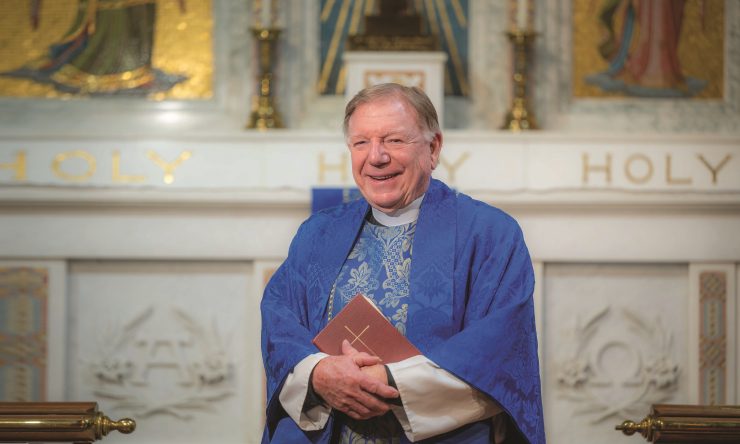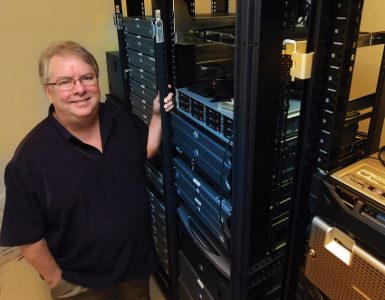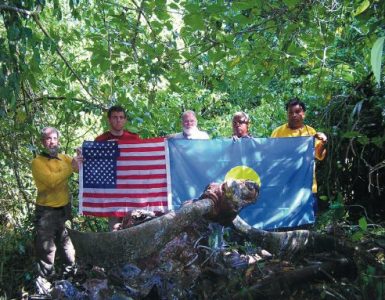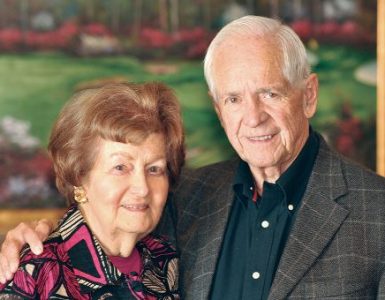For Talmadge “Joe” Bowden, MD, ’66, his University of Georgia ROTC commander — a no-nonsense combat veteran of World War II with a colorful vocabulary — gave him the best advice of his career.
Bowden’s sights were set on following in his father’s footsteps by joining the Air Force and becoming a fighter pilot. His career in medicine, he says, happened almost accidentally.
At UGA, Bowden’s roommate, the late Leslie Wilkes, MD, ‘65, wanted Bowden to join him at the Medical College of Georgia — so much so that Wilkes filled out the medical school application for him.
So, when Bowden got accepted to the Medical College of Georgia and the U.S. Air Force flight school in the same week, “I can’t pursue both careers,” he remembers telling his ROTC commander.
The commander let him have it. “Bowden…” he started, then went into a stream of colorful expletives. Once he calmed down, he told Bowden, “Look, I got these wings, but not everyone who gets accepted to flight school does. If you wash out, you’ll fly a desk. You’ll end up bitter and disappointed because you’ll hear the planes taking off all the time, but you won’t be in the cockpit.”
“He made up my mind for me,” says Bowden. And that first day in MCG’s gross anatomy lab, he knew it was the right choice: “I loved anatomy and learning the awesome way the body was created and functioned. That love of anatomy would lead me to a surgical career that lasted 48 years.”
Bowden would spend his entire professional career in general surgery at MCG — where he helped start MCG’s minimally invasive surgery program — along with stints at Augusta’s University Hospital (now Piedmont Augusta) and the Charlie Norwood VA Medical Center. He adds, “These things happened over time. I had no burning passion or desire for them, but if you believe angels or the Holy Spirit guides you through life, that’s got to be what happened.”
Years later, that divine guidance came again. Like his parents, Bowden had a deep faith, and throughout his career, he had explored what seemed to him to be an obvious connection between prayer and healing. After 30-plus years as a surgeon, he says he felt a call to talk to the bishop of the Diocese of Georgia about becoming a deacon in the Episcopal church with a primary ministry as a chaplain for MCG medical students and residents. Then came another piece of great advice: The bishop said, “Absolutely not. I don’t see you as a deacon. I need a priest.”
After much prayer with his wife, Cissy, Bowden decided to test the waters by taking five weeks off from his practice and enrolling in a summer course at Sewanee – The University of the South School of Theology. He went on to complete his degree and, for the last 16 years of his professional career, worked as both a surgeon and a priest.
Now retired from surgery and serving full-time as assistant rector at Augusta’s Church of the Good Shepherd, Bowden is remembering his long and colorful career with a gift — donating his available resources toward the Talmadge A. “Joe” Bowden, Jr. M.D. Distinguished Chair in Surgery, which, when fully endowed, will support minimally invasive surgery education for residents.
‘A Great Fit’
Years after that conversation with his ROTC commander, Bowden had a chance to fly a Cessna 125 after he was drafted to the Vietnam War and was on active duty at Shaw Air Force Base in Sumter, South Carolina. He hated it — further confirmation that his ROTC commander was right.
But at MCG, he flourished. He loved his time there — loved being able to give patients “half a chance and see them bounce back.” Nights, he’d often be on call with other medical students, and they’d typically be the first to see a patient and analyze the situation. They’d also be on hospice duty, sitting with and supporting patients in their hospital rooms as they lay dying.
“MCG was different then,” Bowden says. “We were given independence far greater than exists now.”
One of his jobs was being a pediatric extern at what was then University Hospital. Bowden thought briefly about pediatrics, but ultimately decided it wasn’t for him. He was late in the game, so he went to William H. Moretz, MD, chair of the Department of Surgery, about possible other residency slots. “I liked surgery,” Bowden says. “You had a problem, you quickly analyzed it, you made a plan, you did it and you had an outcome all within a very compressed period of time.”
Plus, as a lifelong musician who played the violin as a child and later the saxophone, he had the hands for it. “The word surgery comes from the word χείρἔργον, which means hand work in Greek,” says Bowden, whose love of medical history is infamous among his students. “For some, dexterity ain’t their game. But for me, the technical part came easy.”
Residency was a turning point in more ways than one. Bowden recalls the 1970 Augusta riots, when gunshot victims poured into every hospital in town, including MCG’s Eugene Talmadge Memorial Hospital, which then had no emergency room. “We were doing everything we could to triage them, then a bunch came in and Dr. Ed Brackney said, ‘Joe, this kid has multiple gunshot wounds in his belly and some in his legs. You take him to OR 2 and operate on him.’
“It was that independence I was talking about earlier,” Bowden says. “Everyone matured quicker in those days because the independence was there…it was a scary concept, but that’s the way it worked.”
Fortunately, the boy had no major vascular injuries and it was a successful outcome. “That’s when the little bird was thrown out of the nest,” Bowden says.
‘The Right Place at the Right Time’
The next year, Bowden was drafted to Vietnam. “I was hanging on the edge to go,” says Bowden, but then President Nixon began de-escalating the conflict. So, Bowden was sent to Shaw Air Force Base in Sumter, South Carolina, where he performed reconstructive surgery on prisoners of war who had been brutalized and tortured. “It was unbelievable the inhumanity of humans against each other,” he says.
By 1973, Bowden had fulfilled his military obligations, achieving the rank of major and serving as chief of the Division of General Surgery at the U.S. Air Force Regional Hospital at Shaw Air Force Base. He was ready to join a private surgical practice in Myrtle Beach, South Carolina when it was Moretz’ turn to call on him.
In 1972, Moretz was chairing the search committee for a new MCG president. After a national search was unsuccessful, Bowden recounts that the chair of the Board of Regents called Moretz, saying, “Bill, you’re our new president.”
“I don’t want to be the new president,” Bowden says Moretz replied. But Moretz took on the mantle, and with another surgical faculty member leaving for an out-of-state position, the Department of Surgery was down to just four.
Bowden didn’t want to say yes either when Moretz called about a faculty position. “I never had aspirations for academic surgery,” he says. But he and Moretz had become good friends. So, he agreed to stay for a year.
That year would turn into 48. “Well, I fell in love with it,” Bowden says. “Teaching residents and students and all that. Their enthusiasm, their passion was infectious.”
Bowden later served as MCG’s coordinator of student education for nearly 30 years and oversaw the surgical residency program at the old University Hospital, for a decade. He remembers some choice words from some of his student reviews: “too strict” and “intimidating.” Or “Dr. Bowden is nice, but too much damn history!”
“One of the things I always tried to impress on them is that you didn’t get here because you’re so cool and wonderful and beautiful,” says Bowden. “You are smart, but you got here, in the words of Isaac Newton, ‘If I have seen further, it is by standing on the shoulders of giants.’ You got here because all these people came along before you and brought you to this point in time in surgery where you have all this at your disposal.”
Some of those giants were on faculty with him. They included Charlie Wray, MD,’59, who, with Moretz, pioneered the Moretz vena cava clip for preventing pulmonary embolism; the late Bob Parrish, MD, ’56, MCG’s first chief of pediatric surgery; the late? Bob Johnson, MD, MCG’s first chief of surgical oncology; the late Arlie Mansberger, MD, chair of the MCG Department of Surgery, who developed the first emergency room and trauma center at MCG; the late Carl Jelenko, MD, who established the burn unit at MCG and was a founding member of the American Burn Association; and the late Dan Sullivan, MD, ’49, the first fellowship-trained surgical oncologist in Augusta.
Then there was Bowden, who in 1991 along with chief surgical resident, David Rogers, MD, performed MCG’s first laparoscopic cholecystectomy, or minimally invasive removal of the gallbladder — thus introducing minimally invasive surgery to the Department of Surgery.
Bowden also served as president of SAGES, the Society of American Gastrointestinal and Endoscopic Surgeons, which has grown to become one of the largest surgical organizations in the U.S. “I was in the right place at the right time,” says Bowden.
Turning Point
For Bowden, who grew up in a strong Southern Baptist home, faith has always been an important part of his life. He wrote this when Mansberger passed in 2018: “We both had everything in common. We loved surgery, we loved teaching surgical residents, we loved golf, we loved research and writing, and we loved Jesus — perfect ingredients for a lifelong friendship grounded in collegiality and respect.”
In his 50s, Bowden was part of a Commission on the Aging Surgeon for the American College of Surgeons. It made him look at himself: “I was thinking, ‘I’m one of those aging surgeons. This might be the time to think about laying it down.’”
He had served as a layperson at the Church of the Good Shepherd since 1975, leading prayers and non-Eucharistic services. “I’d been interested — long before I was ordained — in the dynamics between spirituality and healing, religion and science, the power of prayer and the power of healing through connection with the divine, in this case, Jesus,” he says. “I’d read all kinds of things, I’d studied, I’d written about it, talked about it. So, I thought, ‘I love the church, I’ve been active in it all my life. It might be a good match.’”
It was another right fit. While his original hope to become an MCG chaplain didn’t work out due to the hospital administration in place at the time, after he was ordained in 2002, he was appointed assisting priest at Church of the Good Shepherd. And he continued to perform surgery until he retired from the VA in 2019.
His faith, he says, like his chosen career, is entirely practical: “It’s the true reality,” he says. “To paraphrase Pierre Teilhard de Chardin, ‘Are we human beings on a spiritual journey or are we are spiritual beings on a human journey?’ The answer is yes, absolutely yes.”
‘Near and Dear’
Bowden shrugs a bit at the suggestion that there’s more behind his named chair than just this simple fact: “It’s just because we can…there’s nothing altruistic about it. There’s no sob story. Education is near and dear to my heart, and anything that can benefit the education of surgical residents, I will support it.”
It’s the last in a line of giving back, which started with a $10,000 gift as part of the President’s Club and included his leading the fundraising for the Moretz/Mansberger Distinguished Chair in Surgery, a chair position that honors the two men he calls his mentors.
Like the other giants in his day, Bowden says, he’s had a good ride. It’s not a legacy so much as a simple statement: “I was here.”
On a National Stage
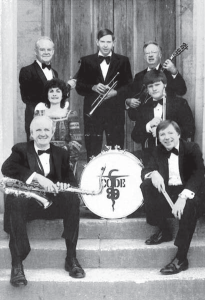
The late Bob Parrish, MD, ’56, former MCG chief of pediatric surgery; Annie Alperin, wife of Henry Alperin, MD, current MCG assistant professor of radiology; the late Gilbert Klemann, MD; Pharmacist Warren Weatherford; the late Ben Moss, MD, ’51; the late John Hudson, MD, ’81; and Bowden
Joe Bowden is a surgeon, a priest, a columnist, a golfer and a military veteran. He also, outside of the COVID blip, has not missed a Masters Tournament in 56 years.
Many may also know him as a musician. What they don’t know is how often Bowden has had a brush with fame.
In 1953, Bowden’s father was stationed in England, and Bowden was taking lessons from the first chair violist at the London Philharmonic. He played with other young musicians for Queen Elizabeth I during her coronation festivities that year. “I still have that violin to this day,” Bowden says.
After his family returned to the United States, Bowden joined the marching band at Albany High School, Albany, Georgia, where he picked up the saxophone. He later played with Ray Ragsdale, who became Ray Stevens, known for songs such as “Ahab the Arab” and “The Streak,” and was a member of the backup bands for Jerry Lee Lewis and Brenda Lee when they toured through Georgia in the mid-1950s.
About a decade later, Bowden and other MCG faculty members and residents formed an all-physician band, Code 99, which lasted four decades. Code 99’s forte was old standards and swing, but their passion was Dixieland. Their finest hour was when they were asked to be the warm-up band for New Orleans’ Preservation Hall Jazz Band when they came on tour through Augusta. During the grand finale, Preservation Hall invited Code 99 to join them on stage for “When the Saints Go Marching In.” “We paraded all over the Imperial Theater,” recalls Bowden. “The audience wouldn’t let us stop playing! It was our happiest moment in our long history.”

